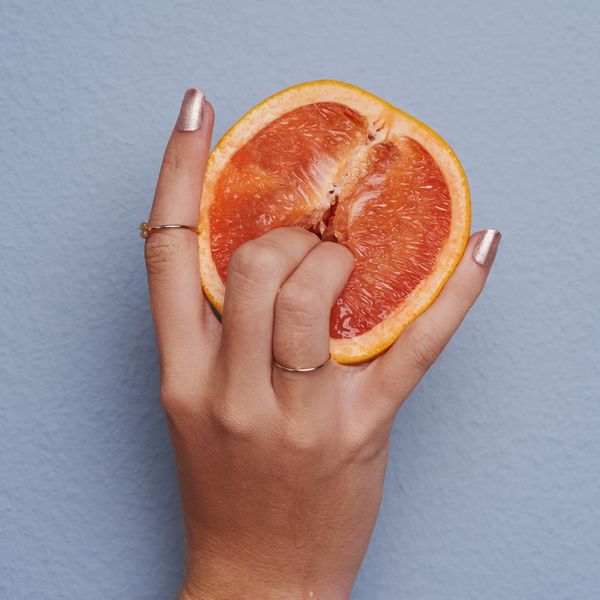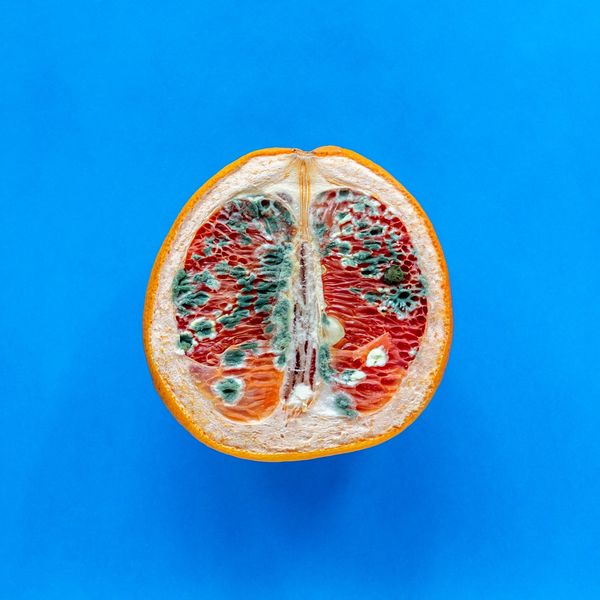
Let's all pretend for a sec that we're in anatomy class again. Remember when you first learned what your vagina actually is? It wasn't your lips (those are your labia majora and labia minora). It wasn't your clitoris (did you know that the only known purpose of a clit is so you can climax easier?). It wasn't your vulva—the external part of your genitalia. No, your vagina is the internal tube that connects your vulva to your cervix (the lower part of your uterus). Babies come out of it and things like penises, vibrators, tampons and menstrual cups go into it.
Why is all of this relevant? Because, in preparation for sharing some things with you that you may or may not know about what's going on down below, technically, I'll be covering your vulva (the part of your genitalia that you do see) and your vagina (the part of your genitalia that you don't). I'm hoping that, with these 15 following facts in tow, you'll love your vagina more than you already do.
Because you already show your vagina (and your vulva) lots and lots of love…right?
Your Vagina Smells Differently Throughout the Day
If it seems like, scent-wise, your vagina keeps switching up on you throughout the day, don't stress it; that's totally normal. When you get out of the shower, you may smell nothing but once you exercise, your sweat glands may cause you to smell a little musty down there. If you're on your period, it might smell like iron, after sex it might smell a little like bleach (due to how your fluids interact with the smell of semen) and, if you have an infection of some sort, it might smell like yeast or fish.
While we're parked on this particular point, something else that can alter the smell of your va-jay-jay is your diet. The foods that can make it smell less than pleasant are onions, garlic, curry, alcohol and coffee. Oh, and due to a new partner's distinctive semen, switching up partners can change how "she" smells too.
The Shape of Your Lips Have a Lot to Do with Your Orgasms
In the article "10 Things You Didn't Know About The Male And Female Orgasm", I shared that when a woman's clitoris is about an inch apart from her vaginal opening, it's much easier for her to have a vaginal orgasm. You know what else helps? The way her lips are made. I'm dead serious.
One study revealed that women who have prominent tubercles (which is basically an elevation of extra skin on the upper part of the lips) of her vagina also gave her a far greater chance of experiencing vaginal orgasms. So, if you're one of those women who feels insecure in a bathing suit because you've got what some folks call a "fatty", don't be. You are that much closer to having what reportedly over 70 percent of women don't—a vaginal orgasm!
You’d Be Amazed How “Big” Your Vagina Can Get
Although your vagina is only 3-4 inches long, its stretching capacity is absolutely amazing! So much, in fact, that it can stretch up to 200 percent (which is how babies can come through it). It's able to do this because your vagina is lined with muscular ridges all throughout it.
What this boils down to is you can handle the size of just about any man; at the same time, in order to initially get into the swing of things, you may need to use a vaginal dilator in order to gradually and comfortably stretch the walls of your vagina in order to, umm, accommodate him.
Discharge and Lubricant Aren’t Exactly the Same Things
This point is pretty fascinating. Did you know that there's a difference between discharge and lubricant? Discharge (which is made up of saltwater, mucus and cells) is what helps to rid your body of bacteria. If your vagina is healthy, the discharge should be a clear, white or off-white color, non-clumpy or irritating and you should only produce around 1-2 teaspoons per day. Lubricant is what comes out, only when you are sexually stimulated.
While discharge comes directly out of your actual vagina, lubrication comes out of two pea-sized glands (called Bartholin's Glands) that are located on the outer sides of your vaginal opening.
There’s More to Your Clitoris than Meets the Eye
When babies are first conceived, they all have the same genetic material. Once they are around 12 weeks, that's when either a penis or a labia begins to form. The reason why you might have heard that clitorises are "little penises" is because, like a penises, they have glans, erectile tissue, a tiny shaft and even foreskin (hence, your clitoral hood). They also get erect and expand whenever you're sexually aroused.
Some other fun facts about your clitoris is it contains 8,000 nerve endings (approximately double what a man has in his penis); it's able to create between 3-16 contractions that are able to last 10-30 seconds long; it grows over the course of your lifetime (it's 2.5 times bigger when you're going through menopause vs. when you were an adolescent) and, it's bigger than you probably think that it is (four inches). It's just that three-fourths of your clitoris is located on the inside of your body.
A Healthy Vagina Is Literally Like Fine Wine
One way to know whether or not your vagina is healthy is to check its pH balance (click here if you want a kit that will let you test it from home). If it's in good shape, your pH will be between 3.8-4.5. If it's higher than that, bacterial vaginosis may be the culprit. If it's lower, it could be indicative of a yeast infection (check with your doctor, just to be sure).
Anyway, since a healthy vagina's pH is around a 4 (which means that it's slightly acidic), I thought you might be curious about what else is—tomatoes, beer and yes, wine. This means that if you wanted to compare your vagina to the best of wines, you wouldn't be lying. That is literally the complete and total truth.
A Vaginal Fart Isn’t a Fart at All
TMI? Maybe. I remember the first time I "queefed" with a partner. I was so embarrassed that I picked a fight and we didn't speak for two days. When we finally did discuss how ridiculous I was being, he said, "It just caught me off guard but it's no big deal."
It really isn't. For one thing, queefing is completely normal. Secondly, all that's coming out when your vagina makes a "fart sound" is air; not waste or gas like real fart has in it. It doesn't smell either, so the next time it happens to you, laugh don't freak out. It's all good.
Nothing Can Get “Lost” in There
Your vagina is not a black hole; it does have an end to it (for the most part, your cervix). The reason why it can sometimes be hard to retrieve a broken condom or a tampon that lost its string is because the item is lodged towards the backside of your vagina. Don't worry, though. If you can't get what's stuck out, your physician most certainly can.
While we're on this topic, my great-grandfather used to say (and I quote), "If you wear short skirts in the wintertime, you're gonna catch a cold in your p—sy." Yeah, that's not exactly true. Your vagina is not a gaping hole that's constantly open. In fact, its walls are actually collapsed on top of each other. They expand when they need to and remain closed when they don't. So, please ignore my grandpa's pearls of wisdom. If they were on Snopes, they would be marked as being "false".
Your Pubic Hair Serves Three (Main) Purposes
Something that I personally found to be a plum trip is the fact that pubic hair has a pretty short shelf life. While the hair on our head can last for up to seven years, the hair on our vagina only lasts for three weeks or so. This is why it can only get but so long or bushy.
As far as the purpose that pubic hair serves, for the most part, it's a three-way combo. First, it protects your vagina from debris. Second, it helps to prevent small abrasions from arising on your vulva due to sexual friction (the less small cuts, the less STD risks you have to worry about). Third, so long as you keep your vagina clean, its natural scent gets trapped into your pubic hair, creating pheromones that turns your partner all the way on. Bonus—a lot of my male friends are huge fans of (well-manicured) pubic hair. They say it's because it makes them feel like they are having sex with a grown woman (which co-signs on a study that says the older we get, the less interested we are in removing our pubic hair anyway). Just something to think about.
Your Vagina Doesn’t Need Douching or Steaming
You've probably known for a while now that, because your vagina is self-cleaning, you absolutely do not need to douche it for any reason. Ultimately, all that does is upset the pH balance in your vagina which can cause all sorts of infections up the road. But what you might not know is you shouldn't steam (translation—go somewhere and sit over a hot pot of herbs in hopes to cleanse and tighten your vagina) either. Aside from the fact that you run the risk of burning your vagina (ouch), there isn't really a lot of evidence to support that it does any real cleansing or tightening. You'd be better off using a DIY cleanse and applying it to your vulva (only) instead.
Vulvas Sag over Time
Something that our body produces less of over time is collagen. When this happens, our skin begins to sag, including when it comes to our vulva. It's nothing to feel bad or embarrassed about (men love vulvas and vaginas regardless), but if you do want to give your vulva a bit of a facelift (so to speak), take a collagen supplement and do some kegels regularly. That should do the trick.
Food in Your Vagina IS NOT a Good Idea
Years back, I told a few of my girlfriends a story I heard about a woman who got maggots in her vagina. No one believed me. I can't wait to forward this to them because there is a documented case of a 79-year-old woman who experienced just that (the technical term for it is vaginal myiasis). Although it is rare, I did look for some medical insight on how to insure that it never happens to you. The best way to avoid vaginal maggots (eww…just eww) is to keep food (dark chocolate, frozen bananas and whatever else your creative mind comes up with) OUT of your actual vagina. Vulva (outside) is fine. Vagina (inside) is not.
Multiple Partners Doesn’t Make It Looser. Abstinence Doesn’t Make It Tighter.
Chile, I ain't had sex in so long that I can only hope this point is true! If you are sexually active and you worry that it's "stretching you out", remember, we are able to birth babies through our vagina and still master the vaginal snapback. Ain't no penis able to match a baby's head. You're good. On the flip side, being abstinent for a long period of time is not gonna make your vagina any tighter either (are you surprised?)
According to many medical professionals, the initial discomfort after a dry spell is probably due to not being aroused enough, needing more lubrication upon entry or your partner not knowing what the heck he's doing; not because going months (or even years) without got you "tight and right".
There goes granny's theory about what makes a va-jay-jay looser or tighter. I can't wait to hear what she says when you tell her.
You Can Get an STD. Even with a Condom.
Finally, if you want or need another reason to make sure that you get tested on a regular basis and that you should require to see a new partner's bill of health before doing the do, I've got one. Even if "he" wears a condom, you can still get an STD.
How is that? It's because if he happens to have warts, a herpes flare-up, or pubic lice, your vulva has the ability to come into contact with his scrotum, and—BAM! You could end up sharing more than a good time. Just one more reminder that a condom is not Teflon, so make sure to choose your partners wisely. For you and your vagina's (and vulva's) sake.
There Is No Such Thing as a “Normal Vulva”
Finally, your vulva is a lot like your fingerprint in the sense that no two are exactly alike. The reason why I said "vulva" and not "vagina" is because most of our vaginas are basically the same. But, as far as the genitalia that we can see, there are different colors, shapes and sizes and they're all beautiful.
So, don't spend a lot of time worrying if some extra skin is hanging or your clitoris is on the larger size. God made it that way by design. The right partner will agree—and then some.
Featured image by Getty Images
Want more stories like this? Sign up for our newsletter here and check out the related reads below:
"What's In There?" An Owner's Manual For Your Vagina
Take Better Care Of Your Vagina With These Tips
10 Things Your Vagina Wishes You Would Do More Often
What I've Learned About My Vagina Since Getting Married
Originally published on June 19, 2019
- Erykah Badu Dropping Products That Smell Like Her Vagina ... ›
- My First Vaginal Orgasm Experience, What It Is - xoNecole: Women's Interest, Love, Wellness, Beauty ›
- 12 Weird Penis Facts You Should Know - xoNecole: Women's Interest, Love, Wellness, Beauty ›
- What Your Vaginal Discharge Means - xoNecole: Women's Interest, Love, Wellness, Beauty ›
- Best Vagina Care Tips Spring Warm Weather - xoNecole: Women's Interest, Love, Wellness, Beauty ›
- 7 Facts Women (And Men) Should Know About the Vagina | Live ... ›
- 20 Facts Every Woman Must Know About Her Vagina | Health.com ›
- Vagina Facts: 10 Mind-Boggling Things You Should Know About ... ›
- Five things everyone with a vagina should know - BBC News ›
- 20 Things You Didn't Know About Your Vagina - Livingly ›
- 10 things you need to know about vaginas | Life and style | The ... ›
- 10 things you probably didn't know about vaginas - Upworthy ›
- Things You Didn't Know About Your Vagina - YouTube ›
- 11 Things You Didn't Know Your Vagina Could Do ›
- 10 Things You Didn't Know About Vaginas - YouTube ›
- 10 Things You Didn't Know About Vaginas | IFLScience ›
- 20 Amazing Vagina Facts All Women Should Know | Glamour ›
- Vagina facts: 28 things you didn't know about your vagina ›
- Vagina facts: What are the 10 things you should know? ›
This Is How To Keep 'Holiday Season Stress' From Infecting Your Relationship
Hmph. Maybe it’s just me, but it seems like there is something really weird happening in the fall season air (because winter doesn’t officially begin until December 21) that cuddle season is in full swing while break-up season is as well. In fact, did you know that break-ups are so popular during the holiday season that December 11 is deemed Break-Up Day?
The reasons why relationships shift around this time vary; however, I did both roll my eyes and chuckle when I read that a very popular one is because it’s an easy way to get out of getting one’s significant other a Christmas present. SMDH.
Anyway, I personally think that the less shallow folks out here may contemplate calling things “quits” or they at least distance themselves a bit from their partner (and what I’m referring to is serious relationships) due to all of the stress and strain that oftentimes comes with the holidays whether it be financial, familial, due to their tight schedules or something else.
Listen, I would hate for you and your man to miss the fun and happiness of experiencing this time of year, all because you are so overwhelmed or irritated that you can’t really enjoy it. That’s why I have a few practical tips for how to avoid allowing the typical holiday season stress from INFECTING your relationship.
Manage Your Expectations
 Giphy
GiphyUnmanaged expectations. If there is a main reason why the holiday season tends to be so stress-filled for so many people, I’d bet good money that this is the cause. And when you’re in a long-term relationship, expectations can manifest themselves in all sorts of cryptic and/or unexpected ways. You might have relatives who assume that you are going to be with them for Thanksgiving or Christmas when you have other plans in mind. You might be thinking that you are going to spend one amount for presents while your man is thinking something totally different. When it comes to scheduling, your signals may be crossed.
And you know what? To all of these scenarios, this is where clear and consistent communication come in. Don’t assume anything. Don’t dictate anything either. From now until New Year’s, mutually decide to check in once a week, just to make sure that you are both on the same page as it relates to the holidays and what you both are thinking will come along with it. The less blindsided you both feel, the less stressed out you will be. Trust me on this.
Set (and Keep) a Budget
 Giphy
GiphyOkay, so I read that last year, 36 percent of Americans incurred some type of holiday-related debt. Hmph. Last year, there was still some sense of normalcy in this country, chile, so I can only imagine what finances are gonna look like over the next several weeks. That said, since I don’t know a lot of people who don’t find being broke stressful, make sure that you and your bae set a budget and then stick to it this year — no ifs, ands or buts.
Because really, y’all — it doesn’t make sense to deplete savings and/or max out credit cards for a few days of giggles only to be damn near losing your mind because you don’t know how to make ends meet come Dr. Martin Luther King, Jr. Day.
And by the way, this tip doesn’t just speak to things like food and gifts; I also mean travel. If it doesn’t make a ton of sense (or cents) to be all over the place this year — DON’T BE.
Keep Matthew 5:37 at the Forefront
 Giphy
GiphyIf off the top of your head, you don’t know what Matthew 5:37 says, no worries, here ya go: “But let your ‘Yes’ be ‘Yes,’ and your ‘No,’ ‘No.’ For whatever is more than these is from the evil one.” That verse right there? Oh, it’s a boundaries lifesaver! I say that because do you see “maybe” or “I’ll think about it” in there? Nope. LOL. It says that you should tell people “yes” or “no” and leave it at that — and that complements Anne Lamott’s quote, “’No’ is a complete sentence” impeccably well. Yeah, you’ve got to remember that anything beyond a yes or no to a request is privileged information; you don’t owe anyone details or an explanation.
Besides, if you are really honest with yourself, when someone asks you something and you give a “Umm, let me think about it” kind of reply, more times than not, you already know what your answer is going to be — so why not let you both off of the hook? Give your response. Commit to that. And let everyone (including yourself) get on with their lives and schedules.
I promise you that when it comes to those holiday parties, you are pissing more folks off by not RSVP’ing or doing so and not showing up than just saying, “Thank you but not this year” off the rip.
Remember That Your Personal Space Is Privilege Not a Right
 Giphy
GiphyA friend of mine recently bought a new house and invited me over to come see it. He’s a single man with no children, so as I was taking in all of the space that he had, especially as I walked through his finished basement, I joked about relatives coming to live with him. “Hell no” and “absolutely not” were pretty much his immediate responses as he went on to say that some folks even had the nerve to be offended when he told them that he had no intentions on taking DNA in.
Ain’t it wild how people think that your stuff is their right? And yes, that brings me to my next point. Your home is your sanctuary space. If you want to host folks this year — cool. If not, ALSO COOL. Please don’t let folks (family included) guilt you into how they want you to act or even into what they would do if the shoe was on the other foot. You are not them — and as one of my favorite quotes states, “If two people were exactly alike, one of them would be unnecessary.” (A man by the name Larry Dixon said that.)
Hell, my friends? They know that I am good for sending them random things that they need or even want all throughout the year. Coming over to hang out at my pace, though. Uh-uh. Chalk it up to being a card-carrying member of the ambivert club yet I like keeping my living space personal — and I sleep like a baby, each and every night, for feeling that way.
Always remember that your space, your time, your resources, your energy and shoot, yourself period (including your relationship), are all things that are your own. You get to choose how, when and why you want to share them. The holiday season is certainly no exception.
Cultivate Some “You Two Only” Traditions
 Giphy
GiphyIt’s not uncommon for some couples to hit me up after the holiday season to “detox.” Sometimes it’s due to the financial drama (and sometimes trauma) that they experienced. Sometimes it’s because they allowed their relatives (especially in-laws) to get more into their personal business than they should’ve. More than anything, though, it tends to be because they didn’t get enough quality time together and so ended up feeling “disconnected.”
Please don’t let that happen. Listen, I’m not even a holidays kind of woman and yet, I will absolutely sit myself down with some hot chocolate and chocolate chip cookies to enjoy a Hallmark holiday film or two. Aside from the fact that most of them are lighthearted and sweet, I also like that they usually focus on couples loving on each other amidst all of the holiday beauty and ambiance — which is something that all couples should set aside some time to do.
Maybe it’s a vacation. Maybe it’s a staycation. Or maybe it’s my personal favorite, A SEXCATION. Whether it’s for a few days, the weekend or even overnight — don’t you let the holidays go by without setting aside time for you and your man to celebrate one another. Don’t you dare (check out “Are You Ready To Have Some Very Merry 'Christmas Sex'?”).
GET. SOME. REST.
 Giphy
GiphyI once read that 8 out of 10 people get stressed out over the holidays and 3 out of 10 lose sleep during to it — and when you’re stress-filled and sleep-deprived, that can absolutely lead to hypersensitivity, making mountains out of molehills and even not being in the mood for sex.
Your relationship can’t afford to go through any of this, so definitely make sure to prioritize rest. I don’t care how unrealistic it might seem during this time, sleep should never be seen as a luxury; it will always and forever be a great necessity.
That said, try to get no less than six hours of shut-eye in (check out “6 Fascinating Ways Sex And Sleep Definitely Go Hand In Hand”) and even ask your bae to take a nap with you sometimes (check out “Wanna Have Some Next-Level Sex? Take A Nap, Sis.”). Not only will sleep help to restore your mind, body and spirit but, when it’s with your partner, it’s an act of intimacy that can make you both feel super connected, even in the midst of what might feel like chaos.
___
Holiday season stress is real. Still, never give it the permission or power to throw your relationship off. Put you and your man first and let the holidays be what they are gonna be, chile.
Let’s make things inbox official! Sign up for the xoNecole newsletter for love, wellness, career, and exclusive content delivered straight to your inbox.
Featured image by Shutterstock
“Late” is an interesting word. I say that because, based on the situation, being late can actually be subjective.
For instance, if you agree to show up somewhere at 11:30 a.m. and you pop in at 11:45 a.m., you are absolutely late. No wiggle room there. Yet when it comes to something like an apology? I mean, when you factor in a definition for late like “occurring, coming, or being after the usual or proper time” — how do you determine when the proper time should be? Is it supposed to be when you want to hear it, or when someone is ready to offer it and actually means the words behind it?
And that is why I decided to put emphasis on the word “late” for today’s topic. Because if you and someone break up and they approach you, well after the fact, with an “I’m sorry,” if you struggle with whether or not to accept it due to the timing of it all, you should definitely ponder that a bit.
And as you’re doing so, it might help to read a bit deeper into what an apology should look and live like, even from an ex, regardless of when it shows up.
Your “late.” Or his right on time.
Three Things That a True Apology Consists Of
 Giphy
GiphyIt’s kind of wild that when you work as a therapist/counselor/coach, a lot of people never really see you as human — and this can include your close relationships. What I mean by that is, it’s almost like they expect you to be free on-call therapy to the point where they “forget” to actually check on you sometimes.
Such is the case with one of my longest-running friendships. Even during the weeks between losing my mother and losing $4K (SMDH), she would just keep calling me to vent about her marriage. I finally got so fed up that I brought it to her attention that for the past couple of years, that is exactly what our friendship has been like: her venting, me listening without her being very invested in my life at all. In response, she texted me an apology — and boy, was it beautiful.
I’m not going to share the details of what she said; however, I am going to tell you three things that it consisted of because it’s what I believe ALL APOLOGIES should entail.
1. She took full ownership for what she believed that she did. I framed this point in this way because, something that everyone needs to forever keep in mind is the fact that two people start and, to a large extent, end relationships — and what I mean by that is, it’s never like one person was perfect and the other was the villain. That said, though, when someone is making an apology to another individual, they are going to own their part and articulate what that part is. It’s not gonna be a simple “My bad.”
It’s going to be “I am really sorry that I wasn’t there for you when you needed me” or “I apologize for taking you for granted” — something that sounds like they get the “offense” that transpired. By doing this, they recognize their missteps — and that is what puts people on the road to not repeating them.
2. She did not deflect or gaslight me. You know what one of the worst apologies are: It’s when someone says they are sorry and then follows it up with, “But you do it too” or “If you hadn’t done ‘A’, I wouldn’t have done ‘B.'” Justifying your actions is a surefire way to make someone believe that you don’t really think that you did something wrong (or that bad) in the first place. And really, how can they trust you (again) if that is how you feel? Oh, and don’t get me on gaslighting.
Ugh, ain’t nothing like someone claiming that they want to set things right with you, only to act like they don’t really get where you are coming from with the issues y’all were having in the first place. A good gaslight line in an apology: “If that is what you think happened, I apologize.” Yeah, you can keep that, jack. Never accept this kind of apology — because it isn’t one.
3. She addressed why she needed to make the apology in the first place. Wanna know one of the main reasons why I don’t trust people who don’t believe in having regrets (check out “Why Regret Might Not Always Be A Bad Thing”)? Did you know that apology means “a written or spoken expression of one's regret, remorse, or sorrow for having insulted, failed, injured, or wronged another.” How, as a human, do you think that you are out here not making any mistakes or poor decisions that you sometimes need to APOLOGIZE for? That is just…insane.
And one of the reasons why apologies are important is because if you feel bad about “failing” someone, it’s usually because you value them enough to want to keep them around. And yes, in my friend’s apology, she also explained why she didn’t want me to feel hurt in the way that she had hurt my feelings and what she would do to prevent that from happening in the first place.
So y’all, with all of this out of the way, before getting deeper into this topic? If an ex is hitting you up to apologize to you for something, please make sure that he hits all three marks of a true apology.
Now let’s keep going.
A Genuine Apology Should Also Include an Amends
 Giphy
GiphyA few years ago, I wrote an article for the platform entitled, “Heads Up: It's NOT An Apology If An Amends Isn't Made.” You know how I mentioned a second ago that a solid apology has no gaslighting in it? Hmph. Ain’t it wild how someone can do something that hurts or harms you and yet, they want you to just “hurry up and get over it”? GASLIGHTING.
Someone in my family, after unpacking years of abuse that I experienced at their hand, they had the nerve to say, “I’m not going to keep apologizing to you for this.” Hmm…Okay. So, how about you let me give you a consistent three months’ worth of the years of mistreatment that I experienced from you and then flippantly throw an apology your way. Let’s see how you feel about it. How much you believe that I am being genuine and sincere.
Listen — and please hear me GOOD on this: when someone really gets the magnitude of the pain or discomfort and inconvenience that they caused, they aren’t going to be fine with just saying that they are sorry for it; they are going to ask you what they can do to set things right.
It’s actually a part of the reason why I named the four children who I aborted (check out “Why I Named The Children I Aborted”) because I do have some real remorse for those decisions. Each of their names have an intentional meaning and I strive to leave out their purpose, through those names, on a daily basis. It’s a small way of making amends.
You know, back when my first book came out, my first love reached out, via email, to send me an apology. The apology hit most of the points that I mentioned earlier. Looking back, there wasn’t an offer to make an amends, though, and trust me, there was A LOT to make up for.
At the end of the day, amends means “reparation or compensation for a loss, damage, or injury of any kind; recompense” and while none of us should use bitterness, resentment or emotional stagnation as the “bar” for which we should expect amends to be made, if you’re trying to figure out just how sincere an ex is with their apology, if they want to do something to make things better, that’s a good sign.
There is a caveat, though.
Discern the Motives. Always.
 Giphy
GiphyEarlier this summer, I wrote an article for the platform entitled, “What's Your Motive For Sex? (It Reveals A Lot. Trust Me.)” Then, a few weeks ago, I wrote another article entitled, “As Cuffing Season Steadily Approaches, What The Heck Is 'Winter Coating'?” and boy, when I tell you that both of these complement this point really well? Goodness.
If you’ve never heard of the dating trend known as winter coating before, it’s basically when an ex creeps back up around cuffing season — and if you know what cuffing season is all about, you can absolutely connect the very probable motives behind those dots.
Now can there be exceptions? There are ALWAYS exceptions. Still, if you haven’t heard from your ex in years and here he comes a couple of weeks before Christmas, unless the two of you got together or broke up around the holidays, stay on potential “winter coating alert,” because it might not be about “building bridges” so much as getting into your bedroom.
That said, if it’s been a minute (six months or more) since you’ve heard from an ex and he suddenly reaches out to apologize, absolutely take out a moment to discern the motive — and shoot, feel fine with even asking what is causing him to make the move…now. If it’s in the spirit of the holidays and wanting to go into a new year with a clean slate, got it. If it’s because he’s been in therapy and realizes that he didn’t end certain things in his past very well, understood. If it’s because he didn’t like how the two of you broke up and he wants to try and make peace, that’s fair.
On the other hand, if you sense that he wants to rekindle something (check out “Nelly And Ashanti Are Giving It Another Shot? Here's What You Should Know About 'Ex Reconciliation'” and “I'm Thrilled That Ryan Destiny & Keith Powers Are Back Together. 5 Things Before Reuniting With Your Ex, Tho.” and “What Happens When 'The One Who Got Away'...Comes Back?”) — although that’s kind of another article for another time, do check that motive.
When someone apologizes, you should really be the only focus for them; not what they can get out of it on the back end. Listen, even if he hopes to get back with you (or back in bed with you), that shouldn’t be something that is discussed during the apology. If it is said or even implied, something about HIS MOTIVE is disingenuous. And if that is indeed the case, to a valid extent, so is he.
We All Should Give the Grace and Mercy That We Desire
 Giphy
GiphySooner than later, I’m going to write an article about forgiveness (beyond what I already have here). For now I’ll just say that if you are someone who thinks that other people don’t deserve forgiveness? That is either your pain or your ego talking and, either way, you can’t trust “their” judgment.
All of us mess up sometimes and if you are a karma (or you reap what you sow) believer, then you absolutely should want to extend others grace and mercy so that you can receive it in your own time of need (and you are absolutely delusional if you think a time won’t come, sooner than you probably think, that you will need it).
Besides, do you know all of the self-inflicted drama and trauma that comes from NOT forgiving others: higher blood pressure, insomnia, stress, anxiety, the higher risk of a heart attack, a weakened immunity, a greater risk for depression and anxiety — whatever he did, is it really worth all of this? Yeah, while a lot of people think that weaponizing forgiveness is empowering, really all it’s doing is putting themselves in harm’s way. Physically. Emotionally. SPIRITUALLY: “For if you forgive men their trespasses, your heavenly Father will also forgive you. But if you do not forgive men their trespasses, neither will your Father forgive your trespasses." (Matthew 6:14-15 — NKJV)
By the way, no one is saying that forgiving that man means that you have to allow him back into your life. After all, access is a privilege. Yet if he comes to you and acknowledges that he feels sorry for some things, for the sake of your own sanity, why not let him express it? Don’t wanna meet up or talk on the phone? Understood. Email and/or text are there for the taking. Don’t want to go back and forth? Who said that it needs to be a discussion or a debate?
All I know is, the more time you spend on this planet, the more you want to put out the energy that you want to come back. Forgiving others tends to make life easier. Not forgiving? Oh, the way that it boomerangs, sometimes in ways you never saw coming, chile. Dodge that kind of experience (and typically hard life lesson) if you can.
Yes, Better Late than Never
 Giphy
GiphyToo late to apologize. Yeah, I don’t really know if there is such a thing (because forgiving and reconciling are not one in the same and some of y’all will catch that later). I’ll wrap this up with a story to prove my point.
Once upon a time, I knew a woman who was in a serious relationship and yet, whenever her boyfriend would bring up the possibility of marriage, she would stall him out. When I finally asked her what her deal was, she explained that she still harbored so much pain from the man before him that she didn’t fully trust that he was the real deal. About five months later, here came her ex with a thorough explanation for why he made some of the decisions that he did while they were together. Now that she had the full story, she was able to heal. She got married to her boyfriend that following year.
You see where I am going with this? Although your ex’s apology might be “late” as far as y’all’s relationship timeline, the timing may be BRILLIANT when it comes to true when and why you actually need it. Yeah, a Scripture that I adore is “Timing is the Father’s business” (Acts 1:7 — Message) and sometimes those apologies, in the grand scheme of things, are more on time than you could ever imagine; they’re when God deems you need them not when you want to have them.
____
It is Oprah Winfrey who once said, “True forgiveness is when you can say, "Thank you for that experience” and sis, if you remove the bitterness and anger and look deeper, there were valuable lessons, even in and from the most challenging relationships. And that is worth appreciating through forgiveness and, if need be, full and complete release.
Bottom line, should you accept an ex’s late apology? Absolutely.
What better way to illuminate your present on a whole ‘nother level.
Just as forgiveness always does.
TRUST ME.
Let’s make things inbox official! Sign up for the xoNecole newsletter for love, wellness, career, and exclusive content delivered straight to your inbox.
Featured image by Shutterstock









